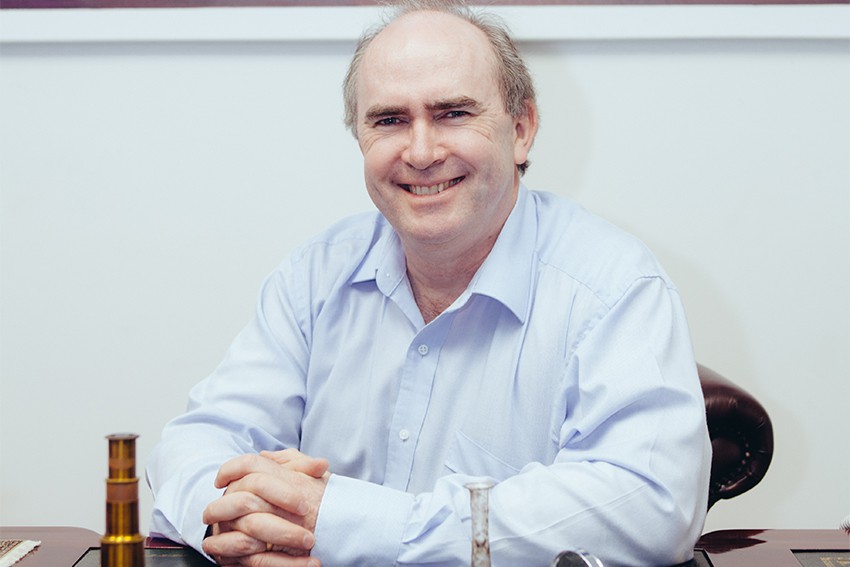off topic: Timothy Sexton

Off Topic and on the record as South Australian identities talk about whatever they want… as long as it’s not their day job. State Opera CEO and Artistic Director Timothy Sexton was set to be a scientist until he decided to be a musician. But his passion for science hasn’t diminished.
“I started getting into natural history when I was five years old, it was just something I gravitated towards,” Sexton – who collects fossils, meteorites and is a keen astronomer and scuba diver – explains. “I wrote a book on it when I was six, would you believe, that I illustrated myself. It actually wasn’t a bad effort,” he laughs. “I wrote another book when I was 10. I used to collect things. All children go through a collecting stage; I just never got out of it. I was fascinated by science, I was the youngest of five boys and my second brother down was a scientist. All my brothers are pretty bright and would introduce me to science and my father, as well, was very much into the natural world and told me about things. I developed an interest at an incredibly young age and really took that interest on. I would have been a scientist until I decided to be a musician in my teens. I got into astronomy when I was 12 but I had a big fossil collection, a big rock collection, seashells and a whole raft of other things. It was just part of satisfying a desire to find out about the natural world.” When he was 12, Sexton and one of his brothers started to build telescopes from scratch. “We constructed our own reflecting telescope, and that really got me into astronomy. I have my own observatory at home, as well. It’s good fun. It’s such an incredible area, looking at the history of life, the size of the universe and our place. It’s all about finding my place in the universe, both the micro and the macro. “It’s amazing looking up and seeing a thousand galaxies outside of our own, it’s humbling. You think about life’s problems and then you look up and think, ‘Actually… let’s put all of this into perspective, shall we?’” Sexton only recently started collecting meteorites. “You purchase those over the net and from suppliers, there are certain reputable suppliers, usually overseas, but there are a few dodgy ones on the market. The meteorites are amazing. These things are as old or older than the solar system – five-and-a-half billion years old. It’s sobering, put it that way.” Would Sexton describe himself as an amateur scientist? “I think that’s probably a fair description. I scuba dive as well, I’m interested in marine biology too. I used to grab my microscope and look at the pond life and all those sorts of things, and I still do. I’ve still got a microscope and I can’t go past a creek without getting a sample and putting it under the microscope to have a look. “As a scuba diver you dive down and see amazing things. With the climate we have, temperate to sub tropical, there is just an incredible range of marine life that we encounter. It’s noisy. It’s really, really noisy down there. You go down and you can hear the little scallops and the fish grinding away at coral and all sorts of stuff – really incredible.” Scuba diving has an additional benefit for Sexton. “It’s the one place where I don’t hear music in my head. I go down and I don’t hear music – peace – it’s great.” Looking up at the stars is a different matter. “It’s actually really good if you’ve got a nice classical soundtrack playing away gently in the background while watching the stars. The thing about observing is that you need to be relaxed. Your eyes and body need to be relaxed because you are looking for very fine details. Things don’t look like they do in the picture books – they’re done in massive observatories with long exposures. When you’re looking with your naked eye, your eye isn’t that receptive. It’s subtle. It’s generally black and white, some colour, but usually black and white. The fine details you see are amazing. It’s about testing yourself to find these objects, which is like finding needles in haystacks.” Has Sexton’s love of the stars and music crossed? “We did a concert some years back with the Adelaide Symphony Orchestra, which was a Star Trek concert. Interestingly, because I’m a real Star Trek and science fiction fan, it was when Andy Thomas was on the Mir Space Station and he actually recorded something for us to be played at the concert. It was incredible. It had to be beamed from the Mir Space Station down to Russia’s Baikonur Space Station. From there it was beamed over to NASA in Florida and then Florida shipped the video to us. The cost – $80! It was inconceivable.” saopera.sa.gov.au